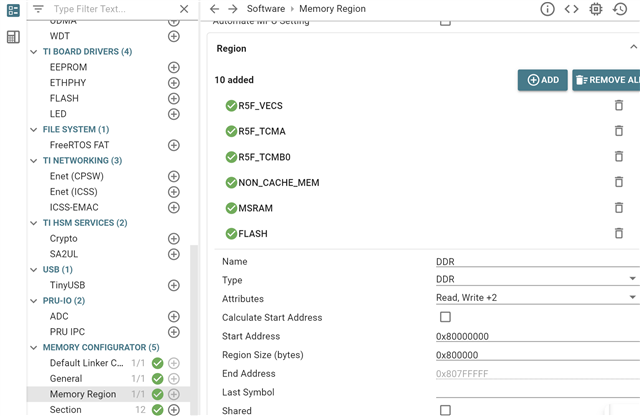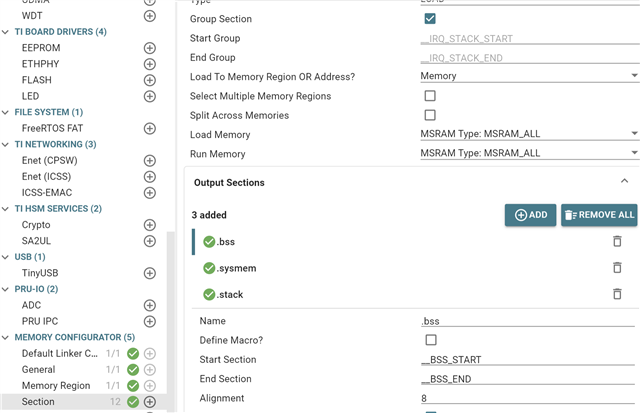Other Parts Discussed in Thread: SYSCONFIG
Tool/software:
I'm getting this error while building a binary with IPC,I2C,GPIO and SPI enabled :
[ 297.873902] remoteproc remoteproc0: powering up 5000000.m4fss [ 297.889147] remoteproc remoteproc0: Booting fw image am62-mcu-m4f0_0-fw, size 71480 [ 297.901798] remoteproc remoteproc0: bad phdr da 0x30000 mem 0x11f80 [ 297.913478] remoteproc remoteproc0: Failed to load program segments: -22 [ 297.920853] remoteproc remoteproc0: Boot failed: -22 -sh: echo: write error: Invalid argument
As far as I'm concerned,it indicates an error occurred while loading the firmware image. phdr refers to a program header, which is a data structure that describes the layout of the firmware image in memory. The error message suggests that there is a mismatch between the expected memory address (da 0x30000) and the actual memory address (mem 0x11f80) of the program header. Here's my linker.cmd file,which I had modified(the heap and M4F DRAM's lenght):
/* make sure below retain is there in your linker command file, it keeps the vector table in the final binary */
--retain="*(.vectors)"
/* This is the stack that is used by code running within main()`
* In case of NORTOS,
* - This means all the code outside of ISR uses this stack
* In case of FreeRTOS
* - This means all the code until vTaskStartScheduler() is called in main()
* uses this stack.
* - After vTaskStartScheduler() each task created in FreeRTOS has its own stack
*/
--stack_size=16384
/* This is the heap size for malloc() API in NORTOS and FreeRTOS
* This is also the heap used by pvPortMalloc in FreeRTOS
*/
--heap_size=65536
SECTIONS
{
/* This has the M4F entry point and vector table, this MUST be at 0x0 */
.vectors:{} palign(8) > M4F_VECS
.text: {} palign(8) > M4F_IRAM /* This is where code resides */
.bss: {} palign(8) > M4F_DRAM /* This is where uninitialized globals go */
RUN_START(__BSS_START)
RUN_END(__BSS_END)
.data: {} palign(8) > M4F_DRAM /* This is where initialized globals and static go */
.rodata: {} palign(8) > M4F_DRAM /* This is where const's go */
.sysmem: {} palign(8) > M4F_IRAM /* This is where the malloc heap goes */
.stack: {} palign(8) > M4F_IRAM /* This is where the main() stack goes */
GROUP {
/* This is the resource table used by linux to know where the IPC "VRINGs" are located */
.resource_table: {} palign(4096)
} > DDR_IPC_RESOURCE_TABLE_LINUX
/* Sections needed for C++ projects */
.ARM.exidx: {} palign(8) > M4F_IRAM /* Needed for C++ exception handling */
.init_array: {} palign(8) > M4F_IRAM /* Contains function pointers called before main */
.fini_array: {} palign(8) > M4F_IRAM /* Contains function pointers called after main */
/* this is used only when IPC RPMessage is enabled, else this is not used */
.bss.ipc_vring_mem (NOLOAD) : {} > DDR_IPC_VRING_RTOS
}
MEMORY
{
M4F_VECS : ORIGIN = 0x00000000 , LENGTH = 0x00000200
M4F_IRAM : ORIGIN = 0x00000200 , LENGTH = 0x0002FE00
M4F_DRAM : ORIGIN = 0x00030000 , LENGTH = 0x00015000
/* when using multi-core application's i.e more than one R5F/M4F active, make sure
* this memory does not overlap with R5F's
*/
/* Resource table must be placed at the start of DDR_IPC_RESOURCE_TABLE_LINUX when M4 core is early booting with Linux */
DDR_IPC_RESOURCE_TABLE_LINUX : ORIGIN = 0x9CC00000 , LENGTH = 0x1000
DDR_IPC_VRING_RTOS: ORIGIN = 0x9C800000, LENGTH = 0x00300000
}
here's the main.c file:
#include <stdlib.h>
#include <kernel/dpl/DebugP.h>
#include "ti_drivers_config.h"
#include "ti_board_config.h"
#include "ti_drivers_open_close.h"
#include "ti_board_open_close.h"
#include "FreeRTOS.h"
#include "task.h"
#define MAIN_TASK_PRI (configMAX_PRIORITIES-1)
#define MAIN_TASK_SIZE (16384U/sizeof(configSTACK_DEPTH_TYPE))
#define I2C_TASK_PRI (configMAX_PRIORITIES-2)
#define I2C_TASK_SIZE (4096U/sizeof(configSTACK_DEPTH_TYPE))
#define GPIO_TASK_PRI (configMAX_PRIORITIES-3)
#define GPIO_TASK_SIZE (1024U/sizeof(configSTACK_DEPTH_TYPE))
StackType_t gMainTaskStack[MAIN_TASK_SIZE] __attribute__((aligned(32)));
StaticTask_t gMainTaskObj;
TaskHandle_t gMainTask;
StackType_t gI2CTaskStack[I2C_TASK_SIZE] __attribute__((aligned(32)));
StaticTask_t gI2CTaskObj;
TaskHandle_t gI2CTask;
StackType_t gGPIOTaskStack[GPIO_TASK_SIZE] __attribute__((aligned(32)));
StaticTask_t gGPIOTaskObj;
TaskHandle_t gGPIOTask;
void empty_main_i2c(void *arg0);
void gpio_led_blink_main(void *args);
void *empty_main_spi(void *arg0);
StackType_t gMainTaskStack1[MAIN_TASK_SIZE] __attribute__((aligned(32)));
StaticTask_t gMainTaskObj1;
TaskHandle_t gMainTask1;
void empty_main(void *args);
void empty_main1(void *args){
int32_t status = SystemP_SUCCESS;
/* Open drivers */
Drivers_open();
/* Open flash and board drivers */
status = Board_driversOpen();
DebugP_assert(status==SystemP_SUCCESS);
empty_main(NULL);
/* Close board and flash drivers */
Board_driversClose();
/* Close drivers */
Drivers_close();
vTaskDelete(NULL);
}
void freertos_main(void *args)
{
int32_t status = SystemP_SUCCESS;
/* Open drivers */
Drivers_open();
/* Open flash and board drivers */
status = Board_driversOpen();
DebugP_assert(status == SystemP_SUCCESS);
/* Create the hello world task */
gI2CTask = xTaskCreateStatic(empty_main_i2c, /* Pointer to the task function */
"empty_main_i2c", /* Task name for debugging */
I2C_TASK_SIZE, /* Stack size */
NULL, /* Task parameter */
I2C_TASK_PRI, /* Task priority */
gI2CTaskStack, /* Stack buffer */
&gI2CTaskObj); /* Task control block */
configASSERT(gI2CTask != NULL);
/* Create the beautiful task */
gGPIOTask = xTaskCreateStatic(gpio_led_blink_main, /* Pointer to the task function */
"gpio_led_blink_main", /* Task name for debugging */
GPIO_TASK_SIZE,/* Stack size */
NULL, /* Task parameter */
GPIO_TASK_PRI, /* Task priority */
gGPIOTaskStack,/* Stack buffer */
&gGPIOTaskObj);/* Task control block */
configASSERT(gGPIOTask != NULL);
empty_main_spi(NULL);
/* Close board and flash drivers */
Board_driversClose();
/* Close drivers */
Drivers_close();
vTaskDelete(NULL);
}
int main()
{
/* init SOC specific modules */
System_init();
Board_init();
/* This task is created at highest priority, it should create more tasks and then delete itself */
gMainTask = xTaskCreateStatic(freertos_main, /* Pointer to the function that implements the task. */
"freertos_main", /* Task name for debugging */
MAIN_TASK_SIZE, /* Stack size */
NULL, /* Task parameter */
MAIN_TASK_PRI, /* Task priority */
gMainTaskStack, /* Stack buffer */
&gMainTaskObj); /* Task control block */
configASSERT(gMainTask != NULL);
gMainTask = xTaskCreateStatic(empty_main1, /* Pointer to the function that implements the task. */
"empty_main", /* Task name for debugging */
MAIN_TASK_SIZE, /* Stack size */
NULL, /* Task parameter */
MAIN_TASK_PRI, /* Task priority */
gMainTaskStack1, /* Stack buffer */
&gMainTaskObj1); /* Task control block */
configASSERT(gMainTask != NULL);
/* Start the scheduler to start the tasks executing. */
vTaskStartScheduler();
/* This line should never be reached */
DebugP_assertNoLog(0);
return 0;
}
where exactly am I going wrong?




